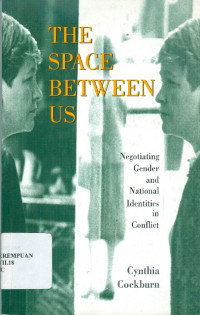
Text
The space between us: negotiating gender and national identities in conflict
The aim of this research is precisely to fill the container 'transversal politics' with content. I wanted to see what exactly is involved in the doing of it. The writer's hunch was that the two key components involved in structuring the space between us (doing transversal politics) would be seen to democratic process. Even in places of deadly national enmity, some very ordinary people are routinely doing peace. In this highly original study, Cynthia Cockburn deepens our understanding of the processes sustaining conflict in Northern Ireland, Israel/Palestine and Bosnia/Hercegovina by means of a close involvement with three remarkable women's projects that have chosen co-operation. How, she asks, do they fill the dangerous space between them with words instead of bullets? How do they make democracy out of difference? The book brings fresh insight to theories of the self in relation to collective identities and of gender in nationalist thought and practice. Observing in words and photographs how these women's alliances create a safe space in which to work together, we learn more about the dangers of essentialism and the problematic relationship between identity and democracy. Person study of three organizations which engage in cross-community peace-building, in Ireland, Israel and Bosnia. Cockburn examines the ways in which digging at one of the oppressions in conflict situations (being a woman AND being an ethnic/religious minority) can soften tensions *when* the women on the other side are also beset by poverty, violence and political exclusion. The case studies are closely observed and realistic--the Belfast organization's big triumph was a warm and supportive visit from Mary Robinson, followed immediately by the center being torched by Ulster paramilitaries as a threat, and their most useful discussions happen when they can swing inviting not just Protestant and Catholic women, but a third group (the case discussed was Chinese women there to give a cooking demonstration), against whom the Irish women could find commonalities.
Availability
| KP.II-00126 | INT VII.18 COC s | My Library | Available |
Detail Information
- Series Title
-
-
- Call Number
-
KP.II.COC d
- Publisher
- London : Zed Books., 1998
- Collation
-
viii, 247 hlm.; illus.; 22 cm
- Language
-
English
- ISBN/ISSN
-
1-85649-617-1
- Classification
-
KP.II.
- Content Type
-
-
- Media Type
-
-
- Carrier Type
-
-
- Edition
-
-
- Subject(s)
- Specific Detail Info
-
-
- Statement of Responsibility
-
-
Other version/related
No other version available
File Attachment
Comments
You must be logged in to post a comment
 Computer Science, Information & General Works
Computer Science, Information & General Works  Philosophy & Psychology
Philosophy & Psychology  Religion
Religion  Social Sciences
Social Sciences  Language
Language  Pure Science
Pure Science  Applied Sciences
Applied Sciences  Art & Recreation
Art & Recreation  Literature
Literature  History & Geography
History & Geography